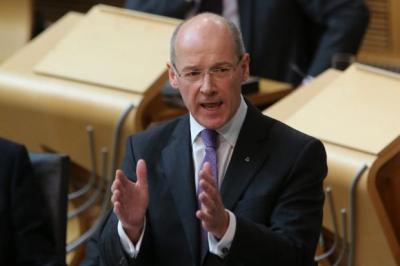A high-profile Yes campaigner, the former British diplomat hoped to become an SNP candidate in either Falkirk or Airdrie & Shotts.
But with a seismic general election around the corner and the whiff or real power at Westminster, the party machine froze him out, while letting through a crowd of the usual suspects - former SpAds, party officers, friends of Alex Salmond and the SNP President's son.
It was, Murray claimed, a classic case of Labour-style political management.
It certainly looks that way.
Here's a longer version of the story in today's Sunday Herald.
Tom Gordon
Scottish Political Editor
A FORMER British ambassador famous for whistle-blowing on human rights abuses in Uzbekistan has accused the SNP hierarchy of “bullying” and a Labour-style “stitch-up” after he was blocked from becoming a general election candidate.
Craig Murray, who was a high-profile independence campaigner, had been asked by SNP activists in Airdrie & Shotts and Falkirk to stand next May.
He said he was failed for lacking “commitment on group discipline” after being asked if he would vote for the bedroom tax if told to by the SNP leadership as part of a Westminster deal with another party - he said No.
 |
| Craig Murray: blocked |
Murray, who unsuccessfully appealed the decision, called it “classic Labour.. political management”.
The SNP has yet to select candidates in Airdrie & Shotts or Falkirk, but in both seats the SNP hierarchy already has favourite applicants.
In Airdrie & Shotts it is Neil Gray, who has been the office manager for the local MSP, Social Justice Secretary Alex Neil, since 2008.
While in Falkirk, party bosses are behind SNP Women’s Officer Tasmina Ahmed-Sheikh, a former Tory and Glasgow lawyer who failed to became an MEP last May.
 |
| Tasmina Ahmed Sheikh and supporter |
In a blog post yesterday, Murray said he had been “astonished by the hostility of the appeals board”, which was chaired by Ian Hudghton MEP, the SNP President, and two MSPs.
He wrote: “They could not have been more personally unfriendly towards me if I were Jim Murphy: their demeanour was bullying.
“I found it a truly unpleasant experience.”
Murray, an SNP member for three years, is now barred from standing anywhere as an SNP candidate.
He told the Sunday Herald: “I’m absolutely shocked. I’m very, very depressed. I think in both Airdrie & Shotts and in Falkirk it’s evident who the party hierarchy wants to be the candidate.
“My own view is the [bedroom tax] question was asked to eliminate me. I’m really gutted.”
The list of would-be SNP candidates who passed vetting includes two former special advisers to Alex Salmond - Jennifer Dempsie and Stephen Gethins - and Ian Hudghton’s son Fraser.
Others include Salmond’s ex-office manager Hannah Bardell, former BBC journalist John Nicolson, who introduced First Minister Nicola Sturgeon at the Glasgow Hydro last month, former Yes Scotland manager Sarah Jane Walls, and Business for Scotland boss Gordon MacIntyre-Kemp.
Burdz Eye View blogger Kate Higgins and comedy club owner Tommy Sheppard also made the cut.
Murray, who was the UK’s ambassador to Uzbekistan between 2002 and 2004, said that by choosing party darlings as candidates, the SNP hierarchy was guilty of Labour-style control-freakery.
“There’s a conflict between the existing party hierarchy and the energy of the Yes campaign.
“I’m really sad, because like many people from the Yes movement I believed we were building a new kind of politics in Scotland.
“Instead, the SNP just seems to be trying to replicate classic Labour Party Tammany Hall political management.”
He also wrote in his blog: “My analysis is that those in the SNP who make a fat living out of it are terrified the energy of the Yes campaign may come to threaten their comfy position.”
Murray was sacked as ambassador to Uzbekistan after questioning US and UK support for the ruling dictatorship, the resigned from the Foreign Office shortly afterwards in protest at that policy.
He once described No supporters as “either evil or quite extraordinarily thick”.
Falkirk is a top target seat for the SNP.
It was won by Labour’s Eric Joyce in 2010 with a majority of 7,843, but he resigned from Labour i in 2012 after a drunken Commons brawl.
Labour’s new Falkirk candidate is former MSP Karen Whitefield, who lost her seat to the SNP in 2011.
In Airdrie & Shotts, Labour MP Pamela Nash is defending a 12,408-vote majority.
The SNP refused to discuss Murray’s criticisms.
A spokeswoman said: “This is an internal party matter. The SNP is and remains completely opposed to the Tories’ hated Bedroom Tax and it is a matter of record that our MPs voted against it at Westminster - most recently on 17 December.”



.jpg)

